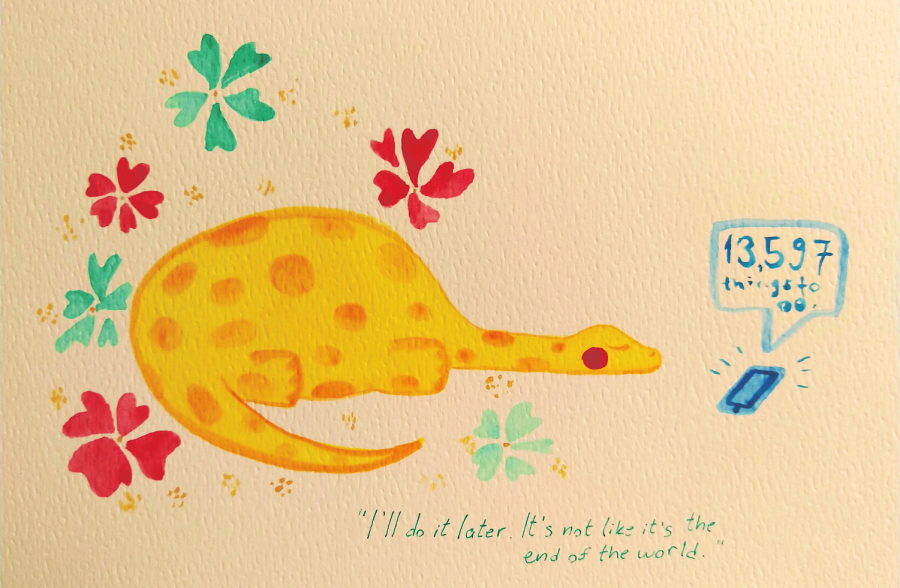It’s okay to procrastinate
November 25, 2020
Ernest Hemingway is believed to have said, “There is nothing to writing. All you do is sit down at a typewriter and bleed.” Gene Fowler, a procrastinator, once asserted, “Writing is easy. All you do is sit staring at a blank sheet of paper until the drops of blood form on your forehead.”
In so many ways, procrastination sucks. I sometimes think of it as self-inflicted psychological torture, and the days that follow late night working sprees are just miserable. Oftentimes, what I find even more disturbing is the buzz of anxiety during the pre-deadline state, where I tell myself that I should be doing certain tasks while proceeding to not do them.
Finals are coming up. I have a few papers due, and I am honestly quite scared.
I procrastinated on almost all of my columns this semester, have procrastinated on this one and will surely procrastinate on future pieces. There are days when I can work through my writing anxiety and produce something I’m pleased with, but sometimes, if I try to force myself to write without the pressure of an imminent deadline, I’ll just end up staring at a blank document, flaring my nostrils as my heart beats quickly.

One of the more pervasive myths surrounding procrastination is that it stems from laziness, but I think there is a massive difference between not doing something just because you don’t want to and not doing something while really wanting to do it.
Understandably, we tend to view procrastination as something in need of correction, and there are countless resources that frame the subject this way. Procrastination, alone, can be awfully frustrating, but on top of that, it can also become a source of shame that gnaws at your self-esteem. Yet, according to professor Frank Partnoy, author of “Wait: The Art and Science of Delay,” we didn’t always see it in a negative light:
“Historically, for human beings, procrastination has not been regarded as a bad thing. The Greeks and Romans generally regarded procrastination very highly. The wisest leaders embraced procrastination and would basically sit around and think and not do anything unless they absolutely had to,” he said.
To be fair, school is an environment that, for the most part, was built for non-procrastinators, and life as a student today is quite different from that of a Greek or Roman leader. Still, there are numerous upsides to procrastinating within today’s contexts, ranging from boosting creativity to enhancing efficiency.
If you procrastinate, one option is to embrace the notion that procrastination doesn’t need a cure, and you can allow yourself the space to plan ahead and do so with structure.
A less radical approach involves forgiving yourself for procrastinating during the present while working towards the goal to not procrastinate. Procrastination is sometimes a sign of an underlying issue, and if it’s an extreme source of stress, it makes sense to want to chuck the habit or work on its root cause. Procrastination is also something that cuts into time for rest and is at odds with self-care.
Yet, if you procrastinate, I think that accepting yourself for the tendency is key — whether you want to change it or not.
To me, it’s okay to procrastinate. In fact, a lot of successful people are or have been procrastinators, including Leonardo da Vinci, Bill Clinton (you can’t deny that he’s successful) and even Margaret freaking Atwood. This doesn’t make procrastination any less painful or self-destructive, of course, but it goes to show that it’s something you can work with.
Some of my best writing is done at 3 a.m., and some of my best essays are the result of near all-nighters. I am definitely not proud of this, but I’m not exactly ashamed of it, either. Maybe I just need to do some more soul searching, but for now, I will keep procrastinating.





